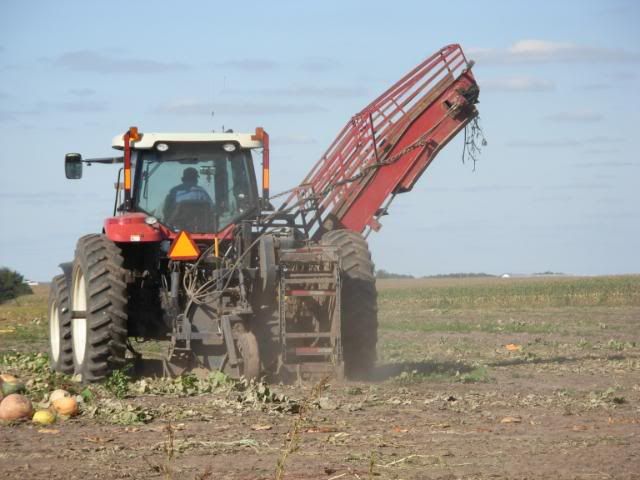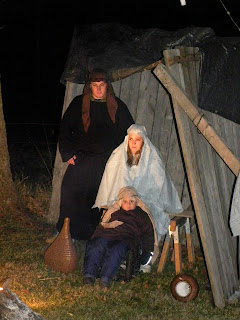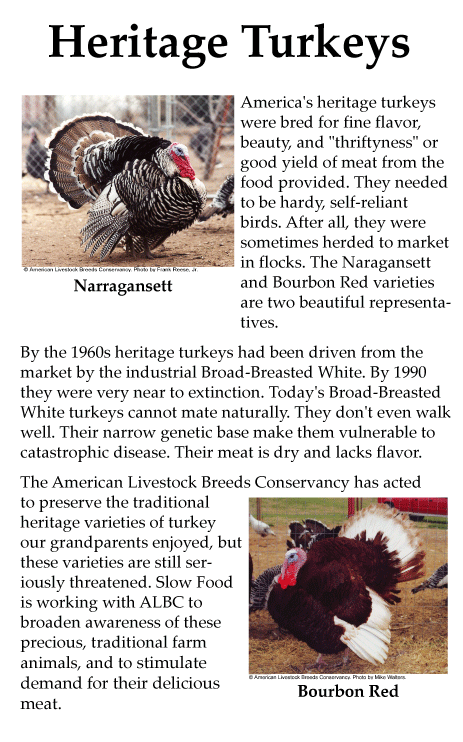
For this month's agriculture info, I chose
PUMPKINS! These are a lot of fun to try growing yourself and they are fairly easy to raise. When we lived in IL, we had the a cool opportunity to live near one of the Libby Pumpkin processing plants. As we drove through the area, I was amazed at the giant fields of pumpkins. And then the fact that they use tractors and machines to harvest these huge fields of pumpkins. We ask one of the local farmers how the process worked. He explained, they plant in the spring and then in the fall as the plants are starting to die off the go through the fields with a tractor with a blade on the front, that gently pushed the pumpkins into rows. Then they would come through with a large machine that had a conveyor belt on it and it kind of sucked and picked up the pumpkins. The pumpkins would take a short ride on the belt and then get dropped into a 18 wheeler dump trailer. The pumpkins were then taken to the plant for processing. I guess that I had always thought that pumpkins were picked by hand, but this was an eye opening opportunity.

Now have you ever wondered why we make Jack O Lanterns or where they got their name? Well I did some looking and found this story about the History of the Jack O Lantern.

People have been making jack-o-lanterns at Halloween for centuries. The practice originated from an Irish myth about a man nicknamed "Stingy Jack." According to the story, Stingy Jack invited the Devil to have a drink with him. True to his name, Stingy Jack didn't want to pay for his drink, so he convinced the Devil to turn himself into a coin that Jack could use to buy their drinks. Once the Devil did so, Jack decided to keep the money and put it into his pocket next to a silver cross, which prevented the Devil from changing back into his original form. Jack eventually freed the Devil, under the condition that he would not bother Jack for one year and that, should Jack die, he would not claim his soul. The next year, Jack again tricked the Devil into climbing into a tree to pick a piece of fruit. While he was up in the tree, Jack carved a sign of the cross into the tree's bark so that the Devil could not come down until the Devil promised Jack not to bother him for ten more years.
Soon after, Jack died. As the legend goes, God would not allow such an unsavory figure into heaven. The Devil, upset by the trick Jack had played on him and keeping his word not to claim his soul, would not allow Jack into hell. He sent Jack off into the dark night with only a burning coal to light his way. Jack put the coal into a carved out turnip and has been roaming the Earth with it ever since. The Irish began to refer to this ghostly figure as "Jack of the Lantern," and then, simply "Jack O'Lantern."
In Ireland and Scotland, people began to make their own versions of Jack's lanterns by carving scary faces into turnips or potatoes and placing them into windows or near doors to frighten away Stingy Jack and other wandering evil spirits. In England, large beets are used. Immigrants from these countries brought the jack o'lantern tradition with them when they came to the United States. They soon found that pumpkins, a fruit native to America, make perfect jack o'lanterns. (From the History Channel)
Now cooking and getting kids to eat pumpkin is great for the added vitamin A and beta-carotene. Check out what is in 1 cup of cooked pumpkin!
Pumpkin Nutrition Facts
(1 cup cooked, boiled, drained, without salt)
Calories 49 Protein 2 grams Carbohydrate 12 grams Dietary Fiber 3 grams
Calcium 37 mg Iron 1.4 mg Magnesium 22 mg Potassium 564 mg Zinc 1 mg
Selenium .50 mg Vitamin C 12 mg Niacin 1 mg Folate 21 mcg
Vitamin A 2650 IU Vitamin E 3 mg
With all that goodness in pumpkin we should really try to use it more often than just once a year.
Pumpkin Pudding is always a great way to slip pumpkin into your diet. You can also use this pumpkin pudding to make a Pumpkin Pudding Pie.
Pumpkin Pudding
1 package butterscotch instant pudding
2 cups lowfat milk
2 cups canned pumpkin
1 teaspoon pumpkin pie spice or cinnamon & nutmeg to taste
Prepare the pudding by adding the milk and mixing/shaking for 1 minute. Stir in the pumpkin and spices. Pour into serving dishes and chill (or into a graham cracker pie crust and chill) Top with a dollop for whipped cream.
Finally this October remember to
save those pumpkin seeds! After cleaning your pumpkin, wash the seeds and remove any other the pumpkin guts from the seeds. Then spread them out on a pan and dry in your oven at 200 degrees for several hours. Make sure to stir them often so they don't scorch. Once they are dry, toss the seeds with oil and lightly salt Roast at 250 degrees for 10-15 minutes.
Have a great and fun October and enjoy those pumpkins!








































